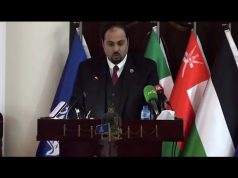ISLAMABAD, Thursday, June 5, 2025 (WNP): Prime Minister Shehbaz Sharif on Thursday denounced India’s unilateral suspension of the Indus Waters Treaty (IWT) as a “blatant violation and act of water aggression,” warning that Pakistan would deliver a resolute response based on the decisions taken at the National Security Committee (NSC) meeting on April 24.
Chairing a high-level meeting on national water security at the Prime Minister’s House, PM Shehbaz declared that just as Pakistan had recently prevailed in a military confrontation with India, it would now assert its rights on the water front with equal determination.
“This is a battle for justice, and like every challenge we’ve overcome with national unity, we will defeat India’s water aggression with wisdom and resolve,” he said, adding that history favors nations that take bold, strategic decisions to safeguard future generations.
The meeting was attended by key federal and provincial stakeholders, including Deputy Prime Minister and Foreign Minister Ishaq Dar, Field Marshal and Army Chief General Syed Asim Munir, chief ministers of all four provinces, the Prime Minister of Azad Jammu and Kashmir, the Chief Minister of Gilgit-Baltistan, and senior civil and military officials.
All provincial leaders and regional representatives unanimously condemned India’s water-related threats and expressed full support for the federal government’s stance. PM Shehbaz hailed this unified position as “a powerful expression of national resolve to protect Pakistan’s water sovereignty.”
The prime minister said that India’s increasing threats to weaponize water — a move that would constitute a clear breach of international law — are legally and politically indefensible. He stressed that the Indus Waters Treaty, a binding agreement brokered by the World Bank in 1960, does not permit any unilateral withdrawal.
To address Pakistan’s growing water needs, PM Shehbaz ordered the formation of a high-powered committee led by Deputy PM Ishaq Dar to develop urgent funding and implementation strategies for new dam projects. The committee, comprising all provincial chief ministers and relevant federal ministers, has been given a 72-hour deadline to submit its recommendations.
“Wherever there is national consensus, we will not delay. These reservoirs are not about politics — they are a lifeline for our nation,” he said, instructing immediate action on non-controversial projects and expedited timelines for inter-provincial consensus dams.
Officials briefed the meeting on the current state of water infrastructure, noting that construction of the Diamer-Bhasha Dam is underway and targeted for completion by 2032, while the Mohmand Dam is expected to be operational by 2027. Pakistan currently operates 11 dams with a total storage capacity of 15.318 million acre-feet, with 32 additional dams under development through the Public Sector Development Programme (PSDP) and 79 more in various stages under annual development plans.
PM Shehbaz also highlighted the grave impact of sedimentation in existing reservoirs like Tarbela and Mangla, which has significantly diminished their capacity. “If we fail to act decisively now, history will judge us harshly,” he warned. “This is not about political survival — this is about national survival.”
He commended the Finance and Economic Affairs Ministries for securing funding from the World Bank and Asian Development Bank despite India’s aggressive lobbying efforts. “For three days, India tried to derail our projects at the ADB — and they failed. This diplomatic victory affirms Pakistan’s credibility and principled position,” the prime minister remarked.
Concluding the meeting, PM Shehbaz reaffirmed his unwavering confidence in Pakistan’s political and military leadership. “Just as our armed forces defended our borders, we must now unite to defend every drop of water for our people,” he said.
Senior government officials present included Defence Minister Khawaja Asif, Planning Minister Ahsan Iqbal, Law Minister Azam Nazir Tarar, Information Minister Attaullah Tarar, Power Minister Owais Leghari, and Water Resources Minister Muneeb Wattoo. Chief Ministers Maryam Nawaz (Punjab), Murad Ali Shah (Sindh), Ali Amin Gandapur (KP), Sarfraz Bugti (Balochistan), AJK PM Anwarul Haq, and GB CM Gulbar Khan also attended.
Seminar highlights legal, diplomatic options amid water crisis
In a related development, a high-level seminar titled “Water Crisis and the Indus Waters Treaty” was held on Wednesday at COMSTECH, aimed at analyzing India’s unilateral treaty suspension and exploring legal, diplomatic, and multilateral responses.
The event — jointly hosted by OIC-COMSTECH, the Karachi Council on Foreign Relations (KCFR), the Hisaar Foundation, and the Panjwani-Hisaar Water Institute (PHWI) — brought together policymakers, legal scholars, and environmental experts.
KCFR Chairperson Nadira Panjwani opened the seminar by emphasizing the treaty’s 65-year legacy and warning of the destabilizing consequences of India’s actions. Zohair Ashir, a PHWI Board Member, underlined the urgency of a calibrated response amid growing tensions between two nuclear-armed neighbors.
Simi Kamal, Chairperson of the Hisaar Foundation and co-founder of PHWI, provided a hydrological perspective on the treaty, calling for integrated, data-driven water governance to address upstream interventions and climate stress.
Renowned environmental lawyer Rafay Alam explored Pakistan’s legal options under international law, including potential proceedings at the International Court of Justice.
Senator Mushahid Hussain Syed described India’s move as a “blow to regional diplomacy,” warning it could damage New Delhi’s global image and further alienate it from China. He called the weaponization of water “a crime against humanity.”
Climate policy expert Ali Tauqeer Sheikh warned that the compounded risks of climate change and hydropolitics require a robust national water strategy. Defence analyst Ikram Sehgal linked India’s behavior to a broader pattern of hostility and warned that water could become the next front if diplomacy fails.
COMSTECH Coordinator General Dr. Iqbal Choudhary concluded the session by urging the Pakistani state to pursue all available legal and diplomatic channels to defend its water rights.




